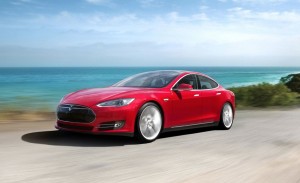
Lower cost, higher-power batteries could make vehicles like the Tesla Model S a lot more competitive.
Tesla CEO Elon Musk is expected to announce plans for a new “gigafactory” later this week, and reports out of Japan indicate the project will involve a $1 billion joint venture with electronic giant Panasonic to set up a lithium-ion battery manufacturing plant in the United States.
The two partners are expected to seek the involvement – and investment – of additional partners, according to Japan’s Nikkei. Among the key goals of the program will be a sharp reduction in the cost of the advanced batteries needed to power vehicles like the Tesla Model S.
The reports have generated some skepticism, and neither Panasonic nor Tesla are directly discussing the reports – or the megafactory announcement the California-based automaker is expected to make on Thursday. Contacted by the AFP news service, a Panasonic official would only say the company is “studying every possible way to strengthen ties with Tesla.”
(Tesla named Top Overall Pick among 2014 vehicles by Consumer Reports. Click Here for the full story.)
But there are plenty of reasons to believe Tesla, and possibly its battery supplier Panasonic, would want to make such an investment.
Batteries are the heart of an electric vehicle – but they’re also the weakest link in today’s products, such as the Model S. They are heavy, bulky, offer limited range, require long recharge times, and are extremely expensive, typically the most costly part of any electric vehicle.
Lithium-ion technology has been improving, Tesla CEO Elon Musk has noted on several recent occasions, becoming more energy dense and coming down in price. Industry sources suggest that where a kilowatt-hour, or kWh, of lithium-ion batteries cost about $1,000 five years ago, that figure has dropped to anywhere from $400 to more than $700 today.
Still, for a Model S with the longest-range 85 kWh battery pack, that means somewhere between $34,000 to more than $60,000. Even on a fully-loaded, $110,000 Model S, that would be a stiff cost penalty.
(Did Tesla make or lose money in the fourth quarter? It all depends upon how you count. Click Here for the story.)
The industry’s goal is to bring batteries down to $200 a kWh or lower, a figure the Boston Consulting Group has estimated would make electric propulsion relatively cost-competitive with conventional, internal combustion-powered vehicles.
Beyond pressing to cut cost, it would be likely, analysts suggest, that Panasonic and Tesla would be seeking to turn out even more powerful batteries packing more “energy density,” or power in a given mass. That would have numerous benefits. It would allow a maker like Tesla to improve range by packing in more charge in the same size battery pack. An EV maker could also use a smaller battery pack to generate the same amount of power – but by reducing weight, the vehicle would see its range improved.
(Tesla, Apple reportedly talked merger opportunities. Click Here for more.)
Tesla recently reported a surge in fourth-quarter demand but has warned that a shortage of batteries could limit its growth. Panasonic has already committed to increase the number of batteries it is supplying the California carmaker. A recently updated contracts calls for Panasonic to provide up to 2 billion cells by 2017.
With Tesla getting ready to launch its Model X battery-SUV this year, and reportedly set to show off a new, lower-priced Model E sedan next year, that may not be enough – which is why a battery megafactory could prove critical.
Among those questioning whether the project is more than a “talking point,” however, is Advanced Research Japan analyst David Rubenstein. He cautioned the Dow Jones Newswires that, “Panasonic’s margins on its battery business are razor-thin, so it’s little more than wishful thinking that this kind of project, if true, would actually add meaningfully to its bottom line.”

It would be nice to create some more U.S. jobs but they will likely be short lived…